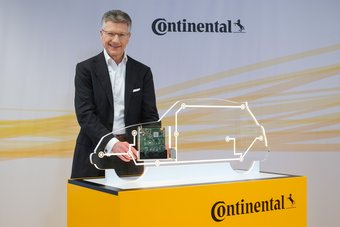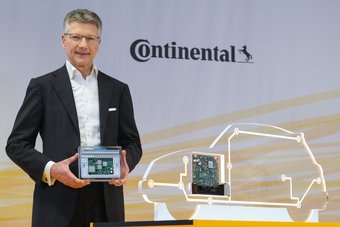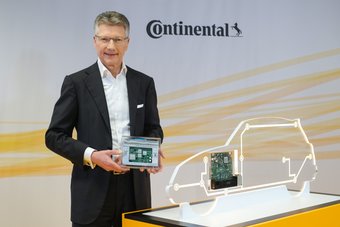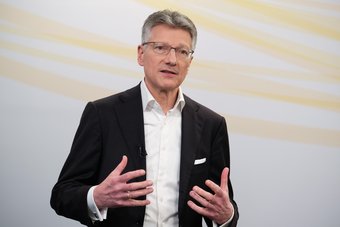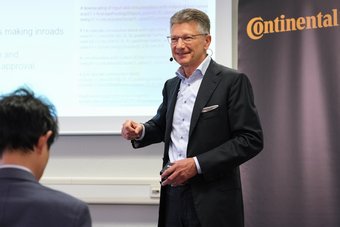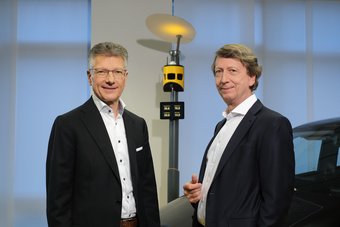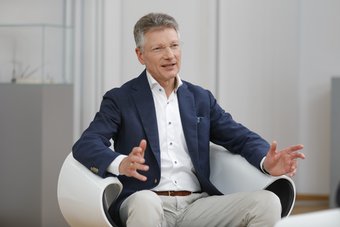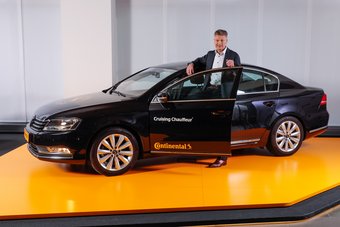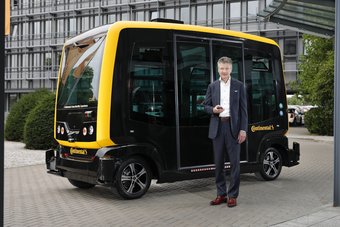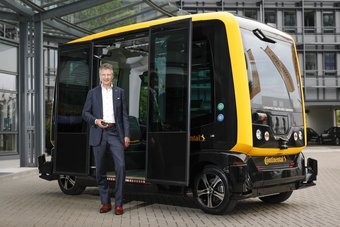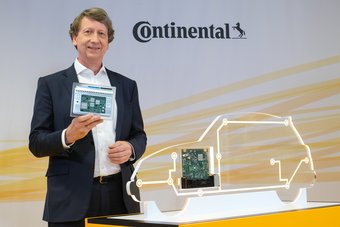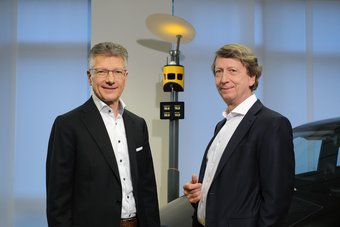Continental Achieves Solid Result and Prepares for Change in Market Environment and Industry
- Market continues substantial downward trend after six months
- Sales in the second quarter at €11.3 billion, adjusted EBIT margin 7.8 percent
- Supervisory Board discusses change in environment and industry
- Executive Board adopts measures in powertrain business to focus on e-mobility
- Production of solid-state battery cells no longer considered part of the strategy
Hanover, August 7, 2019. Continental achieved an overall solid result in the second quarter of 2019 despite a sharply declining market. In the past quarter, the global production of passenger cars and light commercial vehicles was down about 7 percent compared to the same quarter of the previous year. In contrast, consolidated sales, at about €11.3 billion, were 1.0 percent lower than in the same quarter of the previous year. Organic sales growth in the second quarter, adjusted for changes in the scope of consolidation and exchange-rate effects, was down 3.7 percent in the same period. Adjusted EBIT in the second quarter amounted to €868 million. This equates to a margin of 7.8 percent (PY: 10.2 percent). The technology company thus confirms its preliminary business figures for the first half of 2019 as published on July 22, 2019. For the current fiscal year, global production of passenger cars and light commercial vehicles is expected to decrease by about 5 percent year-on-year.
“The current market environment is highly challenging. The key automotive markets of Europe, North America and particularly China are declining,” said Continental’s CEO Dr. Elmar Degenhart. He added: “We are responding to the declining market by ensuring rigorous cost discipline and enhancing our competitiveness.” Degenhart is concerned, however, about the massively increasing pressure on industry locations such as Germany, where energy, tax and social costs are comparatively high.
Moreover, he reported that the automotive industry is currently undergoing a fundamental, dramatically accelerating and partly disruptive transformation worldwide. The company’s Supervisory Board has discussed these challenges, and the company’s management has outlined a strategy for Continental to maintain its financial strength in the long term, increase its competitiveness and safeguard its viability. The resulting need for action is currently being discussed with employee representatives, with the aim of drawing up a plan together in the coming weeks on how to proceed. The Executive Board and employee representatives will report on the results once an understanding has been reached.
Powertrain to focus on electrification; Continental not entering into cell production
The Executive Board has already decided on the next steps for Continental’s powertrain business, which in the future will trade under the name Vitesco Technologies. In response primarily to the tightening of political targets, this business operates in an increasingly disruptive market environment. It is now undertaking necessary adjustments to the portfolio and will in the future concentrate more closely on the business with electric mobility. “We are aligning our powertrain operations consistently toward this since the market is clearly moving in this direction. We benefit from the fact that we have long been a technological leader with broad systems experience in this area,” said Degenhart.
At the same time, Continental has ended considerations of entering into the production of solid-state battery cells. Until now, the company had not yet made a final decision in this regard. The DAX company had always ruled out taking up the production of modern-day lithium-ion cells. After intensive analysis, Continental concluded that it would not invest in the production of battery cells. The technological direction of energy storage for electric mobility is being determined in particular by political targets. The expansion of electric mobility must now occur at an accelerated rate with the help of lithium-ion battery cells. According to Degenhart, the cell production market for the automotive industry is thus going to be divided up among suppliers at a much earlier stage on the basis of this established technology, which is one of the reasons for the decision which has now been made. “The course has therefore been set. Continental can no longer set up an attractive business model with the solid-state technology which will probably not be available until after 2030,” he added.
Changes to powertrain operations due to lower demand for combustion engines
The rapidly changing market is accompanied by falling demand for combustion engines, which has prompted Continental to cease further expansion of its hydraulic components business. This includes the business in injectors and pumps for gasoline and diesel engines, as well as other components. This decision means that existing orders will be fulfilled, but new orders will play an increasingly marginal role.
In addition, Continental is analyzing its business with components for exhaust-gas aftertreatment and fuel supply systems due primarily to intensive price pressure as well as the high degree of dependency on the further market development.
Further information on the specified measures is available in a separate press release published today by the Powertrain division.
Second quarter was solid in sharply declining market environment
“At present, our business is being influenced by the slowdown in global automotive production. With a slight drop in our sales in the second quarter, we were to some extent able to avoid the effects of the negative developments in our markets,” said Continental’s CFO Wolfgang Schäfer, commenting on the second quarter of 2019. He added: “For the second half of the year, we do not expect the headwind to ease.” The company does not currently envisage a market upturn in the short to medium term.
That is why it recently lowered its market expectations for the current year. Continental now anticipates that, year-on-year, the production of passenger cars and light commercial vehicles will be down 2 percent in the U.S.A., 3 percent in Europe, and 10 percent in China. Overall, the company is assuming that global vehicle production will fall by about 5 percent in 2019. These assumptions are the basis for the recently revised forecast of July 22, 2019.
In the second quarter of 2019, the net income attributable to the shareholders of the parent was down 41 percent to €485 million after €822 million in the same period of the previous year.
Free cash flow amounted to -€262 million in the second quarter of 2019, after €82 million in the same period of the previous year. Free cash flow before acquisitions, which includes in particular the cash outflows for the purchase of the anti-vibration specialist Cooper Standard and is calculated before the effects of transforming the Powertrain division into an independent group of legal entities, amounted to -€29 million.
Sales of the Automotive Group fell in the last quarter by 3.1 percent to €6.8 billion compared with the same period of the previous year. Organic growth amounted to -4.9 percent. In the same period, the production of passenger cars and light commercial vehicles declined by about 7 percent. The adjusted operating margin of the Automotive Group was 5.5 percent.
The Rubber Group generated total sales of €4.5 billion in the second quarter of 2019, which equated to growth of 2.5 percent compared with the same period of the previous year. Organic growth in the same period came to -1.8 percent. The adjusted EBIT margin of the Rubber Group was 12.3 percent in the second quarter of 2019.
In the second quarter of 2019, Continental invested €785 million in property, plant and equipment, and software, which is €70 million more than in the same quarter of the previous year. The capital expenditure ratio amounted to 7.0 percent (PY: 6.3 percent). In the same period, the technology company’s research and development expenses amounted to €917 million net, corresponding to 8.1 percent of consolidated sales. The figure for the same period of the previous year was 7.6 percent.
As at June 30, 2019, net indebtedness was about €5.7 billion, which is €1.4 billion higher than on the reporting date for the first quarter of 2019. The increase in net indebtedness in the reporting period is attributable primarily to the outflow of dividends for the previous fiscal year amounting to €950 million. The gearing ratio, which quantifies the degree of indebtedness, had risen to 31.3 percent by the reporting date (PY: 16.8 percent). Net indebtedness was still at around €1.7 billion at the start of the year, which corresponded to a gearing ratio of 9.1 percent. At the end of the first quarter of 2019, this value had climbed to 22.6 percent. The reason behind this development is the mandatory application of the IFRS 16 standard since the start of fiscal 2019. Application of the standard resulted in the general recognition of all leases in the statement of financial position and thus a substantial increase in lease liabilities. Capital expenditure on property, plant and equipment, and software increased as a result of this new standard as well. Continental’s liquidity buffer amounted to about €4.8 billion on the reporting date of the period under review.
At the end of the first half of 2019, Continental had 244,615 employees (at the end of 2018: 243,226; at the end of March 2019: 245,686). The company’s need for software developers is especially high. The technology company already employs some 49,000 engineers worldwide, more than a third of whom have a software background. In the company’s own global software academy, more than 5,000 employees will receive further training in 2019 alone.
All information: H1 2019 results
Dr. Elmar Degenhart
Dr. Elmar Degenhart, Chairman of the Executive Board Continental AG
Wolfgang Schäfer
Member of the Executive Board, Finance, Controlling, Compliance, Law, and IT, CFO






